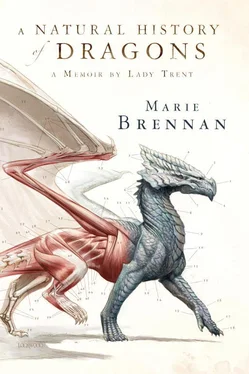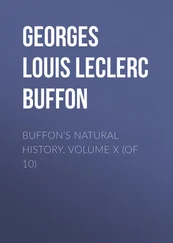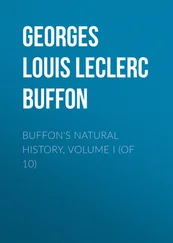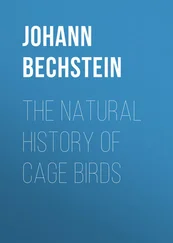In the end, he left me much to my own devices. I had free run of his library and could request certain purchases of him, if there was a title I desired that he had no interest in. Edgeworth and a few other volumes I kept for my own, in my private sitting room. With so much material to read, I must confess that I occasionally neglected my social duties as his wife, failing to arrange the sorts of dinner parties and other events that are expected of our class. Jacob spoke to me about it, and I promised to mend my ways; unfortunately, tragedy soon intervened.
Almost a year after our wedding, I found myself with child, but miscarried after a short time. This left me in a depression for several months, during which I ceased correspondence with nearly all family and friends; I could not even bring myself to write to Manda Lewis, with her healthy son and another on the way. Despite reassurances, I could not shake off a guilty conviction that I had failed in one of my primary obligations as a wife. Jacob did what he could to comfort me, but eventually buried himself in business interests for a time—I was not exactly pleasant company, prone to crying fits as I was. To console myself one rainy afternoon when even books could not hold my attention, I took out one of the few childhood possessions I had brought with me from home: my carefully preserved Greenie.
Jacob found me thus, with the vinegar-soaked sparkling cradled in my hands.
“May I see that?” he asked gently. I started; I had not heard him enter my private sitting room. The motion tipped Greenie over my fingers, and I cried out, but Jacob caught him as he fell, and with such a delicate touch that he was not damaged.
Jacob inspected the sparkling with a close eye. “Vinegar. Who taught you that?”
“The cook,” I said. “I used to collect things, when I was young. All kinds of things, really—rocks and feathers and so on—but sparklings especially. He was the only one I kept, though, when—”
I stopped myself, but Jacob prompted me onward. “When?”
Then I told him about the wolf-drake; he had, of course, seen the scars on my shoulder, but I had been vague about their origins, citing only a “youthful misadventure.” My husband might be tolerant of my interests, but I had not wanted to expose my childhood foolishness so thoroughly. He settled himself onto the sofa with me as I talked, and laid Greenie on my knee. I picked the sparkling up and described the aftermath of that incident, the grey years, and how I had disposed of my collections, keeping only this one relic.
When I finished, Jacob reached forward and wiped away the few tears that had fallen during my recitation. “Sparklings, eh?” he said. “I must concur with your father on the subject of wolf-drakes—I should not like to see you injured—but sparklings seem harmless enough. If you wish to collect them again, I will not stop you.”
Only in silly novels does the sun actually come out at the speaking of such words, but to me, it felt like it did.
The weather continued foul for several days, but that gave time for a crate of vinegar to arrive. The cook eyed me strangely when I came to collect it from the kitchens, but I did not care; having this purpose in my life, however small, helped fend off the malaise that had burdened me for so long.
Jacob affectionately referred to what followed as the Great Sparkling Inquiry. The woodlands around Pasterway, the town outside Falchester in which we lived, were a breeding ground for sparklings, and in the summer and fall one could not take an evening walk without encountering them. I began by collecting the recently deceased, preserving them in vinegar, but soon moved on to butterfly nets and cricket cages, so that I might observe and sketch living specimens. The gardener’s shed was given over to my use, as we did not keep much of a garden and therefore did not need many tools, and I soon filled it to the roof beams.
Many might laugh at me for my fascination—and in fact many did; this was not an eccentricity we could keep entirely quiet—but I rapidly learned that there is far more to sparklings than my childish eye had seen. They differ in size, color, and conformation between males and females, and there is more than one breed; I identified three in the vicinity of Pasterway, though I have since revised that analysis. I learned their behaviours and habits, and poured much unsuccessful effort into coaxing them to breed in captivity.
Earth-shaking discoveries they were not, but the simple fact that I made them lifted me out of my depression and back into the realm of social life. I went out once more, and hosted gatherings at our house; Jacob spent more time at home. With their delicate tails and scintillating wings, sparklings healed the damage my heart had suffered.
In a sense, therefore, sparklings led me to my life’s work not once but twice: first when they seeded my childhood interest in natural history, and again when they brought me back to myself following the miscarriage. Had I not recovered then, I would not have met Maxwell Oscott, Earl of Hilford, and heard of his Vystrani expedition.
Even before my miscarriage, I went to Renwick’s less often than before; it is not the best place for recreation if you are not on the catch for a spouse or shepherding a relative through the process. Jacob’s younger brother, though, had decided to advertise himself as an eligible bachelor, and Jacob had promised to help look out a suitable wife for him.
It was not the best choice for my first truly public outing since my miscarriage. The press of people threatened to become overwhelming, and I had occasion to be glad that entry to the upper rooms was so closely regulated. True crowds, I fear, might have done me in.
As it was, I spent the evening reacquainting myself with Society, the ladies’ comments alternating between solicitous concern for my well-being and pointed barbs about my recent hobby. I endured these latter in polite silence, mostly for Jacob’s sake; left to my own devices, I would have loved to shock the earrings off some of the women I spoke to with a few well-chosen details about my sparkling breeding programme.
My one respite came from Miss Natalie Oscott, a merry-hearted young woman I met early in the evening, and found to be quite a congenial soul. Very nearly the first words I heard her speak were a comment on the historical scholarship of Madame Précillon, and when the ebb and flow of socialization left the two of us alone for a time, I found she had quite as much ink on her nose as I. When she offered to introduce me to her grandfather, I was glad to accept.
“He doesn’t often come here,” Miss Oscott said over her shoulder, leading me through the crowd, “but my cousin Georgia has designs on a husband, and Grandpapa insisted on meeting the fellow—ah, there you are. Have you put the fear of Heaven into the young man yet?”
“The fear of me, which is quite sufficient,” Lord Hilford said, pecking his granddaughter upon the cheek. He was not a tall man, balding and stocky of build, though without the large gut commonly observed among the older peerage. I could imagine him as quite fearsome to a prospective suitor, though he greeted me pleasantly enough. It transpired that he knew Jacob’s father, Sir Joseph, and he congratulated me upon my marriage. “Must have missed the news,” he said apologetically. “I’ve not been in Scirland much these last few years. Puts me quite behind the news, I’m afraid.”
“You’ve been abroad, then?” I asked.
Miss Oscott laughed. “Grandpapa’s hardly ever at home. Too busy visiting exotic places.”
Lord Hilford drew himself up with an air of aggrieved dignity, looking down at his granddaughter—or attempting to, for she was scarcely an inch shorter than he. “I’ll have you know, my girl, that the last six months were entirely for my health. My physician advised me to take the sea waters on Prania.”
Читать дальше












